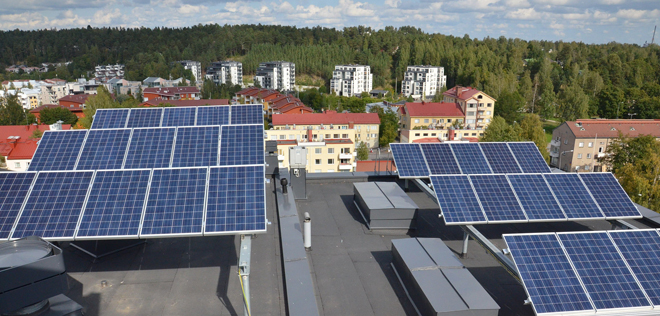Rarely on offer: renewable energy on auction
9.10.2018 Blog Anni Huhtala

Renewable energy subsidies are a major expenditure item in the Finnish state budget. But a change is now in the offing: the state will soon ask electricity producers to place bids, and the subsidies are allocated in a competitive tendering process, Anni Huhtala writes.
 Photo by: Eksergia.fi (Flickr, rajattu, CC BY 2.0)
Photo by: Eksergia.fi (Flickr, rajattu, CC BY 2.0)
Have you ever thought of buying electricity generated with renewable energy sources? Maybe you are already buying wind power or using solar panels. How much are you prepared to pay for getting renewable energy through the wall socket?
If you are a woman, you are more likely to say yes, I will use suppliers of renewable electricity and I am prepared to pay a cent or two more for that.
Nevertheless, most of us would not act like this. This is why not enough emissions-free energy is available in the market. And this is why people are demanding that the state should subsidise the production.
In fact, renewable energy subsidies are a major expenditure item in the Finnish state budget.
However, a change is now in the offing: the state will ask electricity producers to place bids, and the subsidies are allocated in a competitive tendering process.
In other words, electricity producers make a bid in which they promise to produce a certain amount of renewable electricity at a premium that they consider appropriate. The premium is paid by the state (= the taxpayers). The producers placing the bid with the lowest premium will win the auction and will start supplying electricity within three years of the closing of the auction.
Annual production of 1.4 terawatt hours is up for tender. For comparison: about 5 Twh of wind power is generated each year.
How does the state benefit from the premium scheme? It will save a lot of money. Compared with the old subsidy scheme, taxpayers will have to pay less. When the old system was created, it did not occur to anybody that new technologies become available, and all producers were promised a fixed guaranteed price. In wind power, too, production costs have fallen rapidly and for this reason, the producers already in the scheme have been making a lot of money with the guaranteed price. It is almost risk-free for the producers and too expensive for taxpayers.
Does this sound too good to be true? What happens if the premiums placed by competitive-minded bidders are so low that profitable business operations are not possible?
In the auction, the price risk or the risk arising from the product costs is borne by the electricity producer (= the bidder).
Does this sound too good to be true from the taxpayers’ perspective? What happens if the premiums placed by competitive-minded bidders are so low that profitable business operations are not possible? This is what happened in Britain. We have learned from other countries’ mistakes and the suppliers taking part in the Finnish auction must provide collateral. There will also be sanctions on underproduction.
It is clear that in the real world, other things can also go wrong. However, many other countries in Europe have already held auctions for renewable energy premiums. In them, the bids reflecting the production costs have been falling steadily and, at best, the premiums have been close to zero.
Nearly non-existent premiums show that new technologies have become available. This is why subsidies were introduced in the first place.
The aim is that the state would no longer need to act as a broker between taxpayers and electricity producers and that renewable, emissions-free energy produced with clean technologies is supplied and purchased in the market in the normal way. And polluting technology would quietly disappear from the market. It may not go by itself but environmental taxes will definitely put an end to it. And nobody needs to be worried about the emissions generated by their own electricity supplier.
Anni Huhtala
Blog
Environment, energy and climate policy
Press release
auctions
energy
energy consumption
energy markets
households
renewable energy
renewable energy subsidies
technological develoment
wind power

